The Youngbloods
I guess she's gone to
Frisco
Albums
reviewed: The Youngbloods,
Earth Music, Elephant Mountain, Rock
Festival, Jerry Corbitt,
Good and Dusty.
The Youngbloods were fairly successful,
usually
remembered for their cover of "Get Together", which only
became a hit a couple of years after appearing on the band's
debut.
Although the Youngbloods came from roughly the same East Coast
background as The Blues Project and the Lovin' Spoonful, they rocked
more and were a bit darker. Jesse Colin Young had a good
tenor,
but the band started to lose steam after their second album; moving to
San
Francisco and losing Corbitt while recorded their third album, Elephant
Mountain.
Although many considered it their finest, I find Corbitt's absence
makes the album an uneven exercise in jamming. Like a
three-legged stool, the band did not have enough internal cohesion to
really propel themselves with only three members. At the same
time, Young delivered only a handful of singer-songwriter type tracks
on each album, so even with the addition of a bassist the Youngbloods
recorded a lot of covers in their later days. Despite being
standouts on the East Coast, the same did not hold true in San
Francisco. Still, Young has a nice voice, Banana's jazzy
electric piano is a welcome change from the guitar-heavy rock scene,
and Corbitt was a talented guitarist. I would start with
their
self-titled debut and work from there.
Personnel: Jerry Corbitt
(lead guitar), Jesse
Colin Young (bass, vocals, guitar), Lowell
Levinger aka
Banana (guitar, electric piano), Joe
Bauer (drums).
Corbitt quit in 1968(?). Michael
Kane joined on bass
in 1971, and Young switched to guitar.
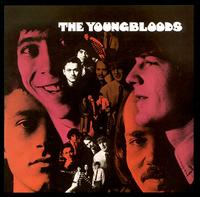 The
Youngbloods (1967), ****
The
Youngbloods (1967), ****
To draw some
sweeping conclusions about a time far removed from my own- once upon a
time in New York, the Lovin'
Spoonful were the smiling
popsters, the Blues Project
were the
traditional R&B/blues band, and the Youngbloods were the rock
band. Sure, the album kicks off with guitarist Jerry
Corbitt's
"Grizzly Bear", a song about a dancing bear who has "gone
to Frisco / to dance it there" written with the same goofy humor
as the Lovin' Spoonful, but it is an exception. This album's
tone is louder (the
brash, distorted lead guitar on Fred Neil's "The Other Side of
This Life"), and darker ("Four
in the Morning", even "Get Together" is bittersweet)
than the Lovin' Spoonful, and Felix
Pappalardi's strong
production gives the instruments a well-rounded sound and distinct
edges. Additionally, the band avoids instrumental
wanderings and this decision helps their more unusual blues covers
(Jimmy Reed's "Ain't That Lovin' You Baby", "Statesboro
Blues", with only "C.C. Rider" being a flop).
Their songwriting is strong as well - Corbitt has two excellent
lighter songs (the aforementioned "Grizzly Bear", and "All
over the World (La-La)") and Young has a similar delight in
"Foolin' Around (The Waltz)". Certainly the album's most
famous track gives rise to the album's claim
to fame is as a precursor to country-rock-- Dino Valenti's
"Get Together" combines Young's smooth tenor, and Corbitt
and Banana's guitar work into a measured vast sounding track.
With all the covers this is a weak four stars, but the Youngbloods
really had it together on their debut (although Pappalardi's
production sure doesn't hurt also).
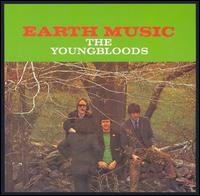 Earth
Music (1967), ***
Earth
Music (1967), ***
While their
eponoymous start only
had a few original songs, their cove were a wise selection of folk and
blues songs without overexposure. On Earth Music,
the band performed more of their own songs, but these and their covers
lack the debut's punch. The situation is largely the
same: Banana's jazzy electric piano, matched with
Corbitt's guitar, but overall the album is quieter and
folkier. It
starts
out strong with the Holy Modal Rounders' "Euphoria", a jugband goes to
Dixieland song, which uses
the band's excellent pairing of Corbitt and Young's voices.
After that, some of the better songs
come
from the band: the poppier "Dreamer's Dream" which would work well on
their debut, and Young's jolly jugband "The Wine Song". Yet,
the
band created (wrote, actually) their own weaknesses. Young's songs are quieter
and more folky
("All My Dreams Blue" and "Sugar Babe"), which suit his more tender
tenor well, yet lack the resonance of the
Youngbloods, as does Young's folk/blues ("I
Can Tell", "Long and Tall"). Banana's
spotlight numbers are a distraction as well: a cover
of "Too Much Monkey Business" and his own fuzzy blues "Fool Me", both
of which are average. This points to their more relaxed,
folkier work, but without being as engaging as their debut. Pappalardi produced some
tracks, the band produced others, and
both produced a few.
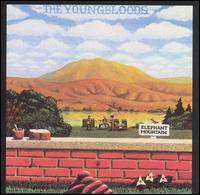 Elephant
Mountain (1969), **1/2
Elephant
Mountain (1969), **1/2
Some
combination of moving out to San Francisco and losing Corbitt drove
the Youngbloods to lighten up further. Young
instantly became
the dominant songwriter, pulling the band in a softer
singer-songwriter direction, but he isn't a dominant musical
personality. Banana does not miraculously change from being a
great rhythm keyboardist/guitarist into a lead one, but his electric
piano work is right alongside Young's guitar as a leading
instrument. Elephant Mountain's problem
is that without
Corbitt the group tended to get lost in jazzy, soft-rock jams
frighteningly often. The first one, a Banana song called "On
Sir Francis Drake" is the best of the bunch - a catchy little
electric piano line that gets worked on a number of ways before the
entire track collapses into more ordinary blues ramble. After
that, the album has a shocking amount of filler--from brief
instrumentals ("Turn it Over", "Double Sunlight",
"Black Mountain Breakdown") to another jazzy instrumental
(the aimless "Trillium"), to 70s
soft-rock (Young's "Ride the Wind" which with some
congas and vibes is a recipe for near narcosis). At
least
Bauer must have been in heaven - he came from a jazz background and
Young is pretty good at portraying the alternately romantically
disappointed ("Smug" is the hands-down favorite on here) or
balladering male ("Sunlight"). Producer Charlie
Daniels (yes, the country fiddler), lacks interesting ideas - double
tracking vocals so that they sound like odd reverb ("Darkness,
Darkness"), leaving in studio chatter between songs. The
best stuff probably came before Daniels' work with
the group.
Aside from a leftover Corbitt/Pappalardi/Collins song that sounds
more like jubgand goofiness than anything on their debut ("Rain
Song" complete with a rain solo) the loudest and most concise
tracks were produced by the group and engineer Bob Cullen ("Smug",
"Quicksand", the bluesy "Sham" with some good
driving guitar work), although Cullen uses more overdubs than
Daniels. This album has not aged well, mostly showing the
Youngbloods slipping into the West Coast slowdown, but does have some
bright spots. Well, at least "Smug" is pretty good.
Jerry Corbitt: Corbitt (1969)
Corbitt's
first solo album. I have not seen it, but he turned far more
country than the remaining 'Bloods albums, and was hanging out with
Charlie
Daniels, if that gives you any indication.
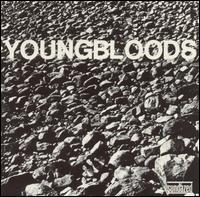 Rock
Festival (1970), **
Rock
Festival (1970), **
Probably
buoyed by their belated success with "Get Together" after
it was used in an ad, the Youngbloods got a contract with Warner
Bros. and their own vanity label, Raccoon. This hectic
background is likely responsible for the fact that this album is
cobbled together from various concerts with a couple of studio tracks
thrown in to round it out. Rock Festival is
a fitting
companion to Elephant Mountain, but not in a good
way.
In keeping with the times and adopted California locale, and without
the benefit of studio overdubs, the group slid right into their jazzy
soft-rock vibe, but without injecting much life into their
work.
Young contributed two songs, one of which ("It's A Lovely Day")
is a definite acoustic throwaway, and the other ("Josiane")
continues the endless soft-jazz of "Ride the Wind".
Banana's standout contributions to the album are
his strikingly
weak vocals (he sounds like an Adam Sandler parody on "Faster
All the Time" and "Fiddler a Dram") and a remarkable
inability to develop a ditty (the banjo piece "Interlude")
into a real song. The best example of the latter is "On
Beautiful Lake Spenard", the partner of Elephant Mountain's
"On the Sir Francis Drake". While the song does
have
subtly shifting time signatures, the track seems to be very
circuitous, almost like one is running around the block repeatedly
but varying it slightly each time - skipping, sliding, etc.
Again, the record has plenty of instrumental junk not serious enough
to be attempts at avant-garde, such that they are more like the
equivalent of a orchestra warming up ("Prelude", "Sea
Cow Boogie", "Ice Bag"). So the band covers of
real, substantial songs stands out, way out. Tim Hardin's
"Misty Roses" makes the band's compositions pale in
comparison, and the studio cover of Jimmy Reed's "Peepin' 'N'
Hidin'" solves some one of the post-Corbitt Youngbloods' problems
- a lack of a sonic focal point. The solution was bring in
harmonica player Earthquake Anderson who adds a much needed
counterpoint to the band's playing, and doesn't make them seem like
just three OK players diddling. Other than that, Rock
Festival is like a garden overgrown with weeds, with a couple
of
flowers dug up from the public garden stuck in the middle.
 Jerry
Corbitt (1970), **1/2
Jerry
Corbitt (1970), **1/2
His
second solo album, before he gave up a solo career. Made with
Charlie Daniels, Jerry
Corbitt
is a country-rock album arranged more like a rock album (fitting in the
age of
Delaney and Bonnie). Corbitt's voice and guitar are in fine
shape,
and Daniels' production switches around country elements like pedal
steel, fiddles
gospel backing vocals to give the album a more mainstream feel.
Of course, an artist is only as good
as his material (well, I guess an album is only as good as its songs),
and JC
has
a lot of decent
material with only a few highlights. Nothing is as goofy or
as
folky as his work with the Youngbloods, and no song
is terrible. The albums starts off well, with
Corbitt blaring
through "Country Boy Blues" working that delightful Southern accent for
all its worth. More singer-songwriter material like "Burning
in
Your Love Light" and a reunion with Young on the guest's "Till You Come
Back Home Again" are also delightful. The back side of the
album
isn't as strong, leading off with Lawrence Hammond's "John Deere
Tractor" - one of those sob stories about how hard the city is on a
country boy. That alone wouldn't be so bad (even though
"Country
Boy Blues" is about the reverse - going to the city), but the song is
slow and kills all energy. The remainder of the flip sounds
stronger, but songs like "Happy Times" (about their absence) and "Get
on Back to the Land" fail to click. Corbitt wrote most of the
material, with Young joining and contributing the one mentioned song,
and a couple of Daniels turnes ("Georgia" and the fine Job-like
"Pain"). I'm guessing that the album was not a success
despite the fact that it sounds great, given
that Corbitt did not release another album in the 1970s, which is a
shame because the album's strongest material holds up well.
Joe
Bauer: Moonset
(1971)
This is what happens when you have your own vanity label.
Ride
the Wind
(1971)
I don't think their final three albums sold very well, as
the few times I have seen them for sale they were expensive.
(In
some minds a rare album is always worth more, regardless of quality).
Crab
Tunes/Noggins (1971)
Credited
to a bunch of people - Banana, Bauer, Kane, Anderson, along with
saxophonist Billy Mitchell and pianist Kenny Gill.
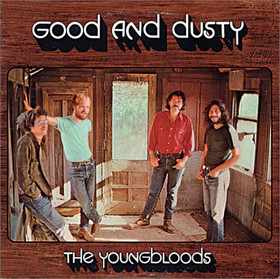 Good and Dusty
(1971), **1/2
Good and Dusty
(1971), **1/2
I
might be giving this album two and a half stars out of politeness. Good
and Dusty
is almost entirely covers of older material - blues ("Pontic Blues"),
R&B ("Stagger Lee"), "Let the Good Times Roll", even the
freaking
hand jive song. Now with new bassist Mike Kane, the band is
almost roots-rock: straight versions with guitars, occasional piano and
Young's sweet tenor. Banana avoids the electric piano, and
the
jazzyness of
Elephant Mountain and
Rock Festival
only flares up in a few spots. I guess this is what you would
expect from a band relocated to a small town north of San Francisco,
got their own label and studio - relaxed, basic and down to earth.
Young has two songs, the blues of "Drifting and Drifting" and
the
better "Light Shine", an attempt at an uplifting anthem ("People let
your light shine" etc). Banana's contribution is the suitably
goofy "Hippie from Olema #5" about how the hippies are morally superior
to everyone else. (The title track is a minute and a half of
instrumental racket). It all sounds fine, but it could also
be a
really great bar band; it's pretty clear they were running out of
ideas. Earthquake Anderson shows up on harmonica again on a
few
tracks. Presumably self-produced.
Jesse
Colin Young: Together (1972)
Young was the only member to have a substantial solo career.
I have not listed his records, even though I own a
couple.
Banana
and the Bunch: Mid-Mountain
Ranch (1972)
A solo album with Bauer, Kane, "Earthquake" Anderson and bassist Steve
Swallow.
High
on a Ridge Top
(1972)
The final Youngbloods album.
 The
Youngbloods (1967), ****
The
Youngbloods (1967), **** Earth
Music (1967), ***
Earth
Music (1967), *** Elephant
Mountain (1969), **1/2
Elephant
Mountain (1969), **1/2 Rock
Festival (1970), **
Rock
Festival (1970), **
